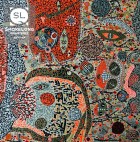In your story “Nail Polish,” you avoid names and pronouns as they pertain to the narrator and the narrator’s romantic partner. Despite this omission, I read the narrator, who owns a navy blue dress, and their partner, who has stubbly legs and painted fingernails, as women, which, upon reflection, caused me to interrogate my own biases and assumptions. To what end did you include and exclude these particular details? Was introspection in this regard a desired outcome for the reader?
Yes, the narrator and her wife are women, and while my primary goal in leaving names out and having the narrator address her wife as “you” was to create a sense of intimacy, I’m delighted if readers subsequently question their assumptions!
Nail polish is obviously integral to your story—the “title track,” as it were: the acetone-sharpness of the well-to-do women being observed; the chipped, sky blue nails of the narrator’s partner; and the narrator’s impulse to paint the chipped nails right again. I have a few ideas, but what is the central metaphor you see the nail polish working at?
Nail polish is both adornment and armor at the same time, isn’t it?
How do you see this story benefitting as flash rather than a longer piece?
I loved the way the (self-imposed) restriction (which is really a kind of freedom) of flash allowed the compression of a couple’s history and present into a single scene, and I hope I’ve left space enough for readers to find meaning in the floating possibilities. This story started with the overheard conversation, and I didn’t at all expect who’d be listening; I think if I tried to expand the story, I’d lose the joy of that surprise (for me as the writer) and the sense of intimacy I hoped to create for the reader.
If there were a song playing in the restaurant as a background track to this scene, what would it be?
I can’t pick one, so here are three: Brandi Carlile’s “Party of One” / Amy Shark’s “Adore” / Beth Orton’s cover of Leonard Cohen’s “Sisters of Mercy.” All playing very softly.



 The core workshop of SmokeLong Fitness is all in writing, so you can take part from anywhere at anytime. We are excited about creating a supportive, consistent and structured environment for flash writers to work on their craft in a community. We are thrilled and proud to say that our workshop participants have won, placed, or been listed in every major flash competition. Community works.
The core workshop of SmokeLong Fitness is all in writing, so you can take part from anywhere at anytime. We are excited about creating a supportive, consistent and structured environment for flash writers to work on their craft in a community. We are thrilled and proud to say that our workshop participants have won, placed, or been listed in every major flash competition. Community works.